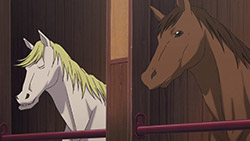 |
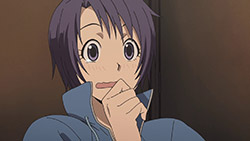 |
 |
 |
 |
 |
 |
 |
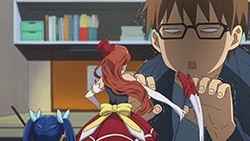 |
 |
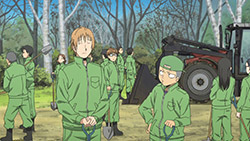 |
 |
 |
 |
 |
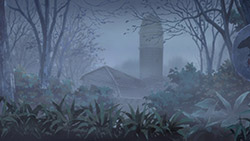 |
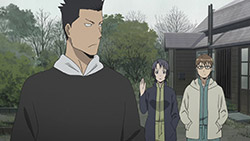 |
 |
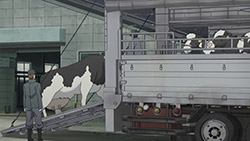 |
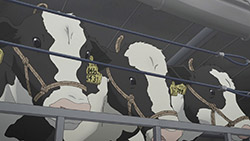 |
 |
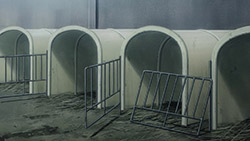 |
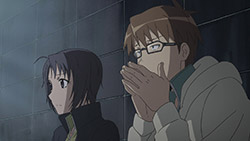 |
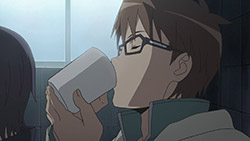 |
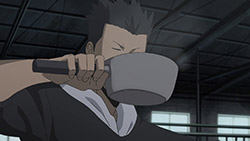 |
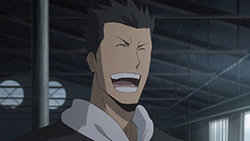 |
 |
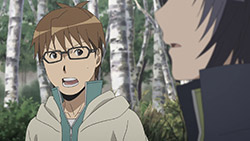 |
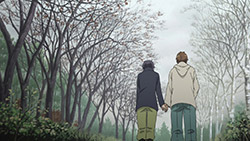 |
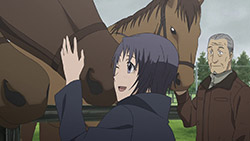 |
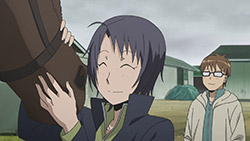 |
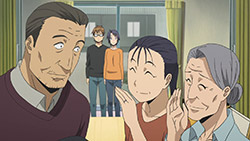 |
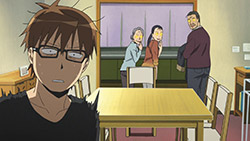 |
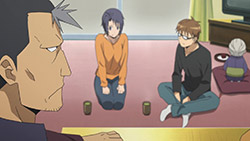 |
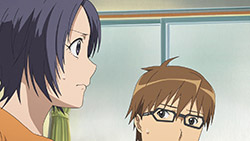 |
 |
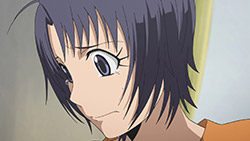 |
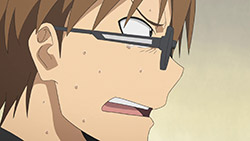 |
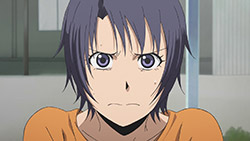 |
「最後の牛乳」 (Saigo no Gyuunyuu)
“The Last Milk”
Once again Gin no Saji brings us a beautiful, terrible sadness.
I really think you’d be hard-pressed to find two consecutive episodes of any anime series that aspired to realism better than the last two of Gin no Saji, no matter how far back you look. They’ve been perfection, really – so emotionally accurate and honest. Even as unpretentiously profound as this series usually is, these eps have really taken things to another level. They’ve been painful to watch at times, but it’s the sort of pain we shouldn’t run away from – which is the lesson Hachiken is learning himself.
I don’t want to overdramatize the point, but Gin no Saji and Arakawa-sensei are really doing the world a service with material like this. There’s the obvious fact that anime needs all the smart and challenging series it can get, but above and beyond that Arakawa is really shining a light on the struggles of people modern society – Japan no less than the West – tends not to like to think about these days. By telling this story – her story, largely – so brilliantly, she’s speaking for those who don’t have much of a voice in popular culture, much less with young people. And it’s a story people really should hear, because it says a great deal about where we are as a modern society, what we’ve gained and what we’ve lost.
I said last week that I hoped Hachiken wouldn’t be able to help Komaba save his ranch – not because I didn’t feel terrible for his family, but because it would undercut the realism of the series. And few series’ success is so dependent on realism as this one – everything from the emotions on up is built on its foundation. As terrible as losing the family farm and a young person forced to give up a dream is, it happens, and not at all rarely. I buy milk from Hokkaido even though it costs a little more, and organic when I’m feeling especially idealistic that day – and while it tastes better, I harbor no illusions that it comes from a family ranch. I’m sure it comes from a giant corporate mega-farm, as most milk in America does.
It’s hard to believe something as simple as the drinking of a mug of hot milk could bring a tear to my eye, but watching the characters do just that did just that. It was the perfect way to end a very sad day – the very last milk from Komaba Ranch. I loved and hated the way that day was depicted – hated it because it hurt so much to watch, loved it for the same reason. Because it was the simple, unvarnished bleakness and dignity of the moment that made it hurt so much. This kind of thing happens all the time, and people try and pick up the pieces and move on. There are no miracles for them – only finding something to focus on, even something small like a part-time job, and getting on with life.
Hachiken wasn’t able to do anything in the end, except simply to be there – and that’s exactly as it should be. A 16 year-old kid – even a whip-smart achiever like Hachiken – can’t lick this problem. I’ve come to realize that the major plot drivers of the first and second seasons are teaching essentially the same lesson – simply because you want to solve a problem doesn’t mean there’s a solution, and simply because something is painful doesn’t mean you shouldn’t experience it. There was no easy answer to the Porkbowl situation and the dilemma of eating meat – at least not for Arakawa or Hachiken – but at the very least, people should understand what’s lost in order to put meat on their table. And simply because Hachiken has no answers for Komaba – or Mikage – doesn’t mean he shouldn’t stand beside them when they’re struggling. This is the essence of Hachiken’s journey for now, a kind of Taichi-esque “be a person who doesn’t run away”. “You’re a curious one.” Aki’s father tells him when he arrives the night before Komaba’s cows are to be sold of. “No part of this is going to be fun.” But Hachiken knows that full well, and in fact it’s the very reason why he needs to be there to see it.
Hachiken learns many lessons over the course of this series, and they’re incredibly universal lessons. That makes Gin no Saji one of the best coming-of-age stories that manga and anime has seen, in my view. One of those lessons he learns is that money really, really matters – and that when people talk about how it doesn’t buy happiness and isn’t important, it’s a good bet that those people have enough not to have to worry about it. Through Komaba and Mikage (and not just them) Hachiken is learning that his own problems are minor compared to some, and that the value of what his parents – even if they “suck” as he puts it – have worked to provide him can’t be overstated. And of course, that goes hand-in-hand with the notion that he has a responsibility to them as a result – and acts as a reminder of what his brother’s rejection of his college education really amounts to.
There’s no easy answers here, as is always the case with this story. There are competing impulses at play, the urge to honor our parents’ sacrifices and the need to be our own person and pursue our own dream. Shingo isn’t a villain for what he did, but he’s walked away from a privilege most in this series will never have. As for Hachiken, it’s important for him to share Mikage and Komaba’s pain because he senses how critical it is to his own growth as a person to not run away any longer. There are other reasons too, of course – there’s no secret any longer of the mutual affection between these two, and Mikage even confesses that she likes Hachiken (sort of). But it’s a testament to how substantial the other issues raised in this arc are that this moment isn’t the headline, only a side-story.
As great as this episode was, I could hardly believe the end credits started rolling when they did – and indeed, we had a six-minute postscript in store for us. It was a tense, powerful and palpably genuine sequence of events as Hachiken walked Mikage back to her ranch, where the family was about to meet to discuss the future of their own business. Hachiken shared with Aki his own self-made crisis of identity – he became so obsessed with living up to his parents expectations that he lost himself completely in the process. For Hachiken, the crisis is the lack of a dream to chase. For Komaba, the dream has already been surrendered – in part so that Aki won’t have to give up on hers. But for Aki, the scariest thing is to have a dream, and not be doing anything to get closer to it.
The issue with the Mikage ranch goes deeper than the loan (¥15 million, about $150,000) that her family co-signed for. Aki has her own dreams, and they’re not to take over the ranch. We haven’t heard the full details of what that dream is, but we know the basics – and we know she loves horses. Her grandfather declares that the family will sell all their horses – “just a hobby” the old man says, though he clearly loves them – to help raise money to pay off the loan. This is the last lifeline gone for Aki, the one thing that made the idea of running the business almost tolerable. Hachiken doesn’t hesitate in urging her to speak her mind at the family meeting, and he’s being a good friend in doing so – but this is serious business, and a difficult situation to say the least. He is indeed an outsider, as he says himself – and even if the family is already sizing him up as a potential husband, he has no right to a say in this discussion. But he has a duty as a friend, too – as always with Gin no Saji there are two sides to the story, and no easy way to bridge between them.
This is obviously a critical moment in the story, and will almost certainly be the central focus of the last two episodes. But in the larger picture, this is still preamble – a part of Hacihiken’s journey towards himself. Life is a giant puzzle, and he’s finding pieces everywhere – in the lives of his friends, and in the realities of farm life. Whatever the Mikages decide, whatever path Aki chooses, Hachiken still must discover his own path – and even if that’s at Mikage’s side, he still needs to decide where it is he wants to go. No matter what lessons he learns from the lives of those close to him, ultimately Hachiken has to face himself and find the answer in the mirror – he can’t find it anywhere else. That leg of the journey may never be depicted in the anime, but it will almost surely be the focus of the manga’s eventual concluding arc.

Hachiken being a perfect husband….
jeez won’t they just go out already
At first, after hearing the unintentional confession, I was like, “Wow! A romance episode! Many romantic scenes! Much doki-doki! Wow!” but then after the OP rolled, I couldn’t have been more wrong. :3
I’m probably emotionally spent right now. This was initially my “healing” episode of the week for most of the first and second season. Now it’s the “see how much I can cry” series, which in a way is still cathartic and is definitely just as emotionally touching and honest as before. I’m just kind of dead afterwards.
Recently, except for KLK, this week’s animes have been very emotional. Its like a chain of combos hitting to no end, and that includes GnS.
Having such high hopes, with lights everywhere when Aki’s almost “confess” to Hachiken…dang!!! Door open! Man! Just give them 5 more minutes would ya! Terrible hanging and yet, amazingly, Aki still sees Hachiken as a great friend without fidgeting and dramas. Now thats, realistic 🙂
God, i really cannot handle the real side of Aki. It makes me wanna cry and hurt all over me kokoro seeing how fragile and timid she is from the inside. She has so many things to say,cant imagine how long she has been holding herself back…poor gal! Im really glad Hachiken was there during the meeting. Kinda reminds me of Jay Gatsby a little, stressing out to Daisy confessing her true feelings lol.
Anyway, cant wait for next week! Please dont tell me they’re coming to an end soon! I dont want this series to finish ever!
But as far as I could remember, Gatsby didn’t end well… (remember the distant green light)
Hahaaa…yea..it was tragic. I mean, Hachiken looks like Jay Gatsby when he tried to pursue Aki to be brave…lol XD
Arakawa-sensei has brought such a wonderful mix of humor, drama, romance and teenage angst to this story and thankfully the animators have had the good sense not to mess with it, but tell the story straight.
A good synopsis of this and the last episode. The only disappointment I had was that they rushed the part where the students were not thinking of Komaba’s situation as much as they related it to their own concerns about the family farms in the future. There is a very strong streak of fatalism among the farm families. They feel life is hard and no matter how good you are or how hard you try, you just have to accept bad things happening. Hachiken has trouble accepting that and sees Komaba and Aki’s rejection of his concern as a rejection of him. To them, they can’t understand why someone would take on another’s troubles when there is enough to go around. His refusal to back down and accept their shutting him out is giving Aki the strength and support she needs to actually voice what she want’s instead of just accepting that her life is preordained.
Aki almost blurting out that she loved Hachiken was as powerful as any outright confession if not more so. Her reaction at her realization of how she really feels just brings tears to my eyes. Which is not to say that the emotions expressed by the other characters didn’t affect me, from the twins trying to hold back their tears (and losing), the mother thanking the men taking the cows (what strength of character to be able to do that with such grace), to Komaba bringing the last of their milk to drink.
And the answer is: Crab!
“The only disappointment I had was that they rushed the part where the students were not thinking of Komaba’s situation as much as they related it to their own concerns about the family farms in the future. There is a very strong streak of fatalism among the farm families.”
I think this could be explained in terms of the fact that it happens all the time. Since the students have been brought up to succeed their family business, most if not all would obviously have their fair share of woes. In a way, it is Hachiken who is different from the norm. As he came from a background where he does not have to worry about putting food on the table or tight budgeting, he does not recognise the difficulties everyone else faces.
If you own a business and the economy is down, it is unlikely that you would worry about another’s shop when you already have enough to worry about. Sure, as they say, they are sympathetic, but they understand that unless the business is liquidated, the creditors – and indirectly the people who deposit their money to these creditors (banks), would be the ones who bear the burden.
Sorry, I was unclear. You basically nailed what is brought out in manga and I felt the anime didn’t include enough of the manga’s details. The points you and the manga make are important to understanding the world the students grew up and will live in and how they have learned to deal with it. Your point about Hachiken is well taken also. His world is different from his friends and he doesn’t always understand, but one of the great things about him is that he is always striving to understand.
Tears welled up three or four times this episode – when Mikage cried, when the cows were leaving and the imoutos cried, when they drank the milk, and when Mikage quaked with fear at feeling unable to pursue her dream. Then I exulted when Hachiken urged Aki on and she finally stood up, declaring to her family that she had a dream.
Now I’m going to work on my own dream, just and Enzo and others are doing right now. That’s the power of a great story like this.
Also, I’m glad you’re writing about this show, Enzocchi.
Thanks, Stilts-chama. I was glad Hachi urged her on too, but it’s a two-edged sword. I wouldn’t blame her Dad one bit if he was furious at Hachi for meddling.
I want to protect that smile ;_;
https://randomc.net/image/Gin%20no%20Saji/Gin%20no%20Saji%20Second%20Season%20-%2009%20-%20Large%2026.jpg
When the ending song played with this smile, it made me cry.
When people were talking about the episode previous to this one, and about whether Hachiken would actually try and save the Komaba ranch (which would’ve been respecting Hachiken’s character) versus the path where things just don’t go that way (which would’ve been realistic, in turn), I wondered what would Arakawa do.
Were this show American, I bet there would’ve been a huge rally to save the Komaba ranch, to make a miracle. And were this show American, I bet they would’ve succeeded. Because America (and here I mean the whole continent) is more about stories of trying hard and achieving, of man-made miracles and sappy happy endings. I mean, just turn to watch some feel-good slice-of-life 80s-90s Hollywood movies, especially with kids as central characters. We’re cheesy like that.
But lo and behold, this is Japanese slice-of-life – REAL slice-of-life; unlike all the ‘cute girls living a cute school life’ shows around that are labeled as such. This is a show driven by coming-of-age and by mono-no-aware; and this episode (IMO more than any other, even the Porkbowl saga) is testament to that. And Arakawa certainly doesn’t pull the punches.
But even in the face of bleak realism and drama, Arakawa still asks “why not both?”. And she does so in the best way possible, even. You can’t just save the dreams of everyone, but that doesn’t mean you have to resign yourself to save none. Mikage, you can do it!
I don’t necessarily think it’s because it’s “japanese” and not “american” slice of life that it’s able to depict the raw realism of farm life that Silver Spoon has accomplished. Not every american story is happy-cheesy endings, and same for japanese or any other culture. I do agree that this show is truly a slice of life, perhaps it might even be unfair to call it simply a slice, when it seems to be much more of the pie.
This has nothing to do with American and Japanese -_-; Great many Japanese series also have miracles solve a realistically unsolvable problem and you also have American shows that are more realistic.
What matters is the writer and his/her skill. Arakawa is an experiences story-teller who does not hold back… although she also does not make a huge drama out of it all. Gin no Saji is a truly mature show, rare in both western and eastern media.
I think that’s a terrible generalization to make. Japanese anime has tons of “deus ex” moments where things somehow work out through the power of friendship, hard work etc. You must be new to anime because i honestly have no idea how anyone could come to such a conclusion.
In fact that’s what makes Silver Spoon actually stand out among all the slice of life shows that i’ve seen as it’s easily has the most realistic atmosphere with how the world works and isn’t just fluffy clouds and rainbows all the time.
The tears, oh Lord the tears…
Friendship is a marvelous thing. Enduring all the struggles through life is less hard when a friend is supporting you, and the victory moments are more enjoyable too. The bonds that have been growing between Hachiken, Mikage and Komaba are of this kind.
OMG, what is anime coming to? I rewatched this episode and noticed they actually have a scene of a boy and girl, who have not confessed to each other, walking together holding hands!. XD